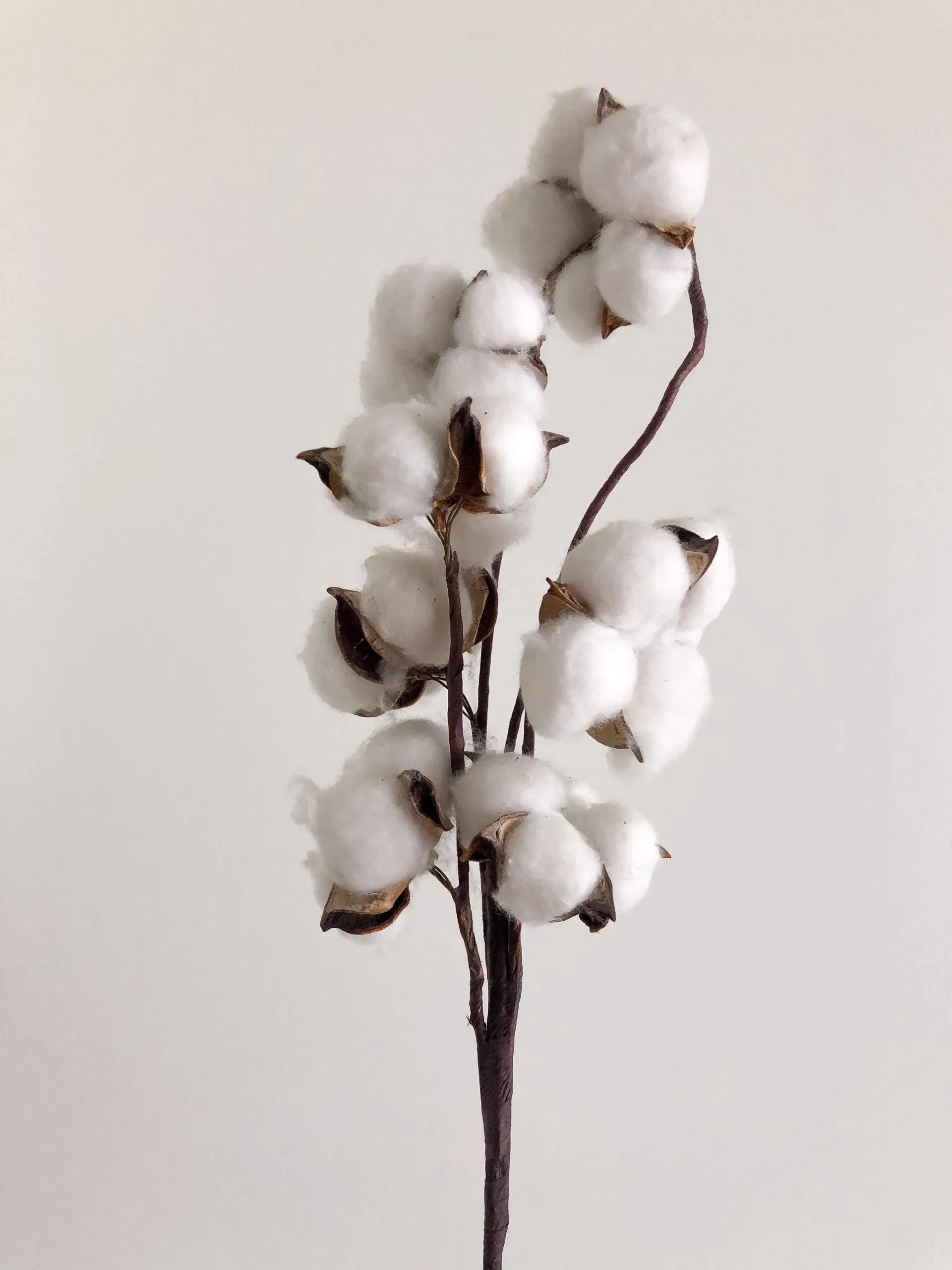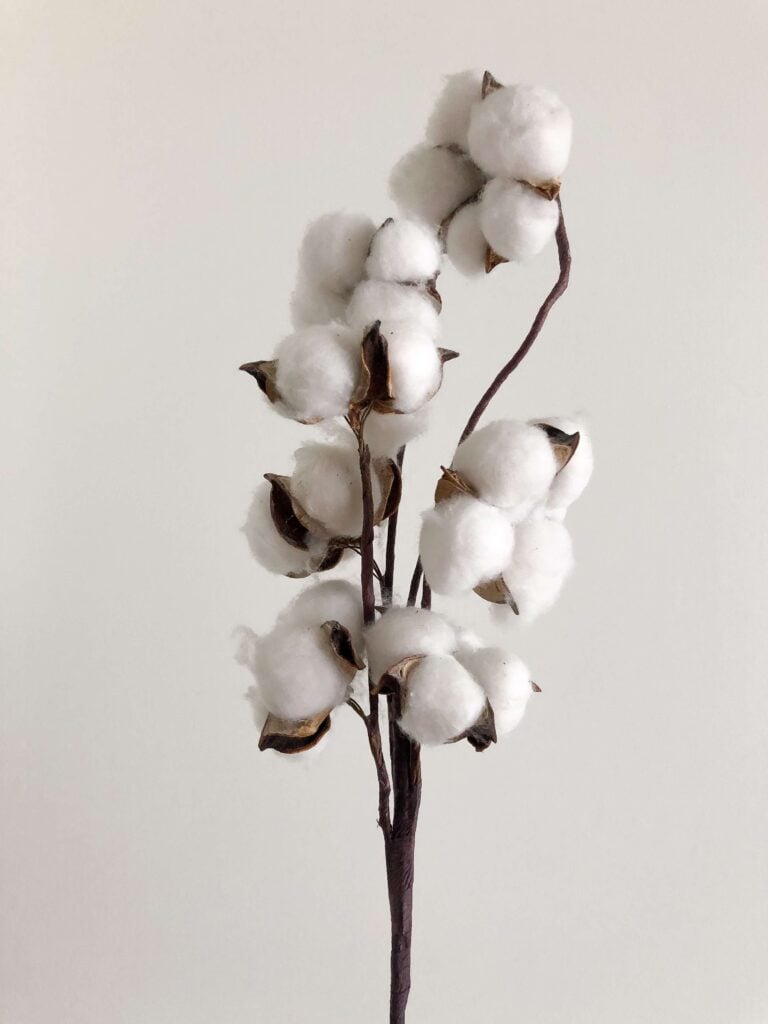
With the increase in sustainable fashion and the need for brands to use more eco-friendly materials and fabrics, there has been a rise in organic cotton as an alternative to conventional cotton.
This article will look at the benefits of organic cotton vs. cotton and discover why it is becoming a favored material amongst eco-conscious consumers over conventional cotton.
Don’t have time to read the full article? Check out 10 quick facts about conventional cotton.
Cotton vs Organic Cotton
It is estimated around 60% of global fiber production is destined for the fashion industry, with approximately 26 million tonnes of cotton produced for the fashion industry globally.
Conventional cotton uses 44 trillion liters of water for irrigation every year, whilst Organic Cotton uses up to 91% less.
Cotton also has the highest water footprint of any fashion fiber, using around 44 trillion liters of water annually for irrigation alone. So it’s clear that cotton cultivation fuelled by the growing demands of the fashion industry is a massive drain on our earth’s water resources. In terms of global water usage, cotton production equates to around 3% of the total global water usage every year.
How is conventional cotton grown?
Conventional cotton (Gossypium spp.) is cultivated from GMO seeds with pest resistance to ensure larger yields. Conventional cotton is a resource-intensive and environmentally damaging crop. Cotton production uses around $2 billion worth of pesticides every year and is responsible for 16% of global insecticide use, more than any other crop worldwide.
The pesticides and insecticides used leech from the soil and enter the air through spraying, damaging the soil and polluting nearby waterways, including rivers and streams. Exposure to these various chemicals used in pesticides and fertilizers can have serious health risks for farmers, garment workers, animals, plants, and even consumers.
In addition to pesticide and insecticide usage, cotton requires vast quantities of water irrigation to grow, using around 44 trillion litres of water annually.
In addition to the chemicals used as fertilizers, chemicals are also sprayed on picked cotton once it has been harvested. These chemicals include Heavy metals, Ammonia, Phalates, and Chlorine, which can have adverse health effects on weavers and garment workers.
These chemicals can remain bound to the cotton fibers and cause problems for consumers, including skin irritation, especially for people with sensitive skin.
So what are the differences between Organic cotton vs. conventional cotton?
The main difference between organic cotton and cotton is how the cotton is farmed and how the soil is managed.
Organic cotton is a non-GMO crop that is grown in a way that replenishes the soil and protects biodiversity. Farmers must meet strict agricultural standards which ensure their cotton is recognized as organic.
Organic cotton is grown without using chemical pesticides or toxic fertilizers and instead relies on farming methods such as crop rotation and natural pest management, which includes spacing crops to prevent disease contamination.
Cultivating organic cotton also results in a reduction of water usage of up to 91%, with organic cotton requiring only 180 cubic meters of blue water (fresh groundwater and surface water from boreholes, rivers, and lakes) per tonne of organic cotton compared to 2,120 cubic meters required per tonne of conventional cotton.
In addition to reduced water usage, organic cotton cultivation results in a 46% reduction in global warming potential, meaning a reduction in CO2 emissions.
Is there any difference in material quality?
While both cotton and organic cotton produce soft, breathable fabric, organic cotton is a stronger, more durable fiber while still being soft to the touch because chemicals have not broken down the fiber, as is often found in conventional cotton.
Organic cotton is also suitable for people with sensitive skin, as it isn’t treated with harmful chemicals as conventional cotton is.
So why doesn’t every fashion brand use Organic cotton?

The main reason ultimately comes down to price. Organic cotton costs more per tonne than conventional cotton; therefore, fashion brands purchasing large quantities are reluctant to pay the price increase. In addition, organic cotton yields are lower than conventional cotton, making many farmers unwilling to switch to organic cotton.
However, the Soil Association found that organic cotton can bring a more stable income to farmers despite the slightly lower yields because organic cotton farmers plant other crops alongside their cotton.
Often the secondary crops grown are food crops or other crops, which can provide farming families and their communities with a diverse food supply and another source of income.
Overall Top five Benefits of Organic Cotton vs. Cotton
- Reduced water Usage, Organic cotton uses up to 91% less water than conventional cotton to grow.
- Better for the planet thanks to a reduction in greenhouse gas emissions - by up to 49%.
- No harmful pesticides or toxic chemicals are used to grow organic cotton, which protects the soil, and prevents air and water pollution.
- Better for farmers, families, and communities as farmers can produce secondary crops, including food crops, during crop rotation.
- Organic is hypoallergenic and suitable for sensitive skin.
Wrapping Up: Organic Cotton vs. Cotton
It’s clear to see from the data that organic cotton is a more sustainable material than cotton, thanks to the reduction in water, pesticide, and energy usage.
Now when you’re shopping sustainably, you’ll know the difference between organic cotton and conventional cotton.
If you enjoyed this article, and want to learn more about other eco-friendly materials, check out our material guides on Tencel, Jute, and Cupro.
Want to discover organic cotton clothing? Check out our favorites for organic cotton underwear, pajamas, robes, short sleeve t-shirts, and long sleeve tops.
If you have any questions or feedback, make sure to leave a message in the comments below and we’ll get back to you.



